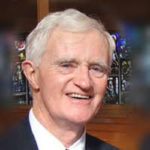We cannot wish people a Merry Christmas without taking some personal action. And the recipe for that action is central to the Gospel message of Jesus. We are called to be a commonwealth of peoples, not a conglomeration of self-interested individuals – Margaret Thatcher notwithstanding.
Can we sincerely wish someone a Merry Christmas this year? Just maybe we can.
Easter is the greatest Christian feast; Christmas comes second. But in popular culture Christmas is the most popular and most merrily celebrated. It is above all a family feast, not just a church one. It has an undisputed place in the national culture of the West.
It is also a holiday. And in the southern hemisphere it is the start of the big summer break. So many take their annual work leave at this time that the cities become half deserted from Christmas into January. The southern hemisphere is more than happy to exchange the big holiday for the snow and sleigh bells of the north. So, in southern multi-cultural societies, like Australia, Christmas becomes a holiday for everybody.
For Christians Christmas celebrates a key belief that God is incarnate in our world. The Christian God became human as one of us. Jesus is God taking flesh – the human face of the invisible God and the reassurance that God is intimately involved with humanity.
But it’s the trimmings of Christmas which engage us more. The crib with Jesus, Mary and Joseph, Christmas carols, Christmas trees, gift-giving and a bit of indulgent eating and drinking. Our imagination is full of scenes which scream Christmas.
Many of these images come from the gospels of Luke and Matthew. Both these writers wrote their stories because they believed the life death and resurrection of Jesus was an intervention by God in human history. The puzzle of life itself is solved firstly by Jesus showing us how to live fully and peacefully and secondly, reassuring us by his resurrection that life wins out in the long run.
The two stories of his birth and childhood seem to have been written after the original story was composed. Like overtures to the main act, they weave stories which seem to mix recollections and fables which link him up to Israel’s own vast story.
They are very different stories. Luke’s story is bright and hopeful; Matthew’s is darker and more political. Luke has angel choirs singing joyfully; Matthew has Herod’s soldiers out to kill Jesus. Luke focuses on Mary’s gracious “yes” to the angel’s announcement; Mathew focuses on Joseph as the protector escaping with the child and his mother as refugees to Egypt. Bethlehem is of more important for Luke; Nazareth is for Matthew. Luke has low-born shepherds as the first to recognize Jesus; Matthew has soothsayers from the East follow a heavenly star to find him and worship him. They inadvertently set Herod on a murderous rampage to kill the child. These intricate stories forewarn the reader that there is much to “make merry” about, but also, a lot to be wary about.
Wishing a Merry Christmas in 2020 needs to be accompanied by a warning alert to keep an eye out for danger. Perhaps Matthew’s story is the more relevant today.
Forest fires are almost inevitable. The virus has wrought havoc round the globe leaving a trail of death, illness, disruption and suspicion. Worldwide the political balance is moving to more authoritarian than participatory government. Old wives’ tales are crowding out established scientific facts. The inescapability of social media demands more effort to establish balanced policy. Identity politics cuts out the middleman of argued compromise. A new nationalism creates a dog in-the-manger prejudice against the poor and oppressed who face barriers as they seek refuge or the chance to live decently. Statesmen have vacated the political stage for sectarian ideologues – often enough, also demagogues. Reason has left the scene. Simple decency is in short supply.
But one threat overwhelms all the others – climate change. Despite the skepticism of deniers, the fact is that the earth is warming and that we are contributing to it by our CO2 emissions and human change to the flora balance on the planet. Rainforests are the lungs of the planet working symbiotically with human existence. The destruction of these is a major factor in the warming. Increase of temperature of the atmosphere will make life increasingly more difficult for the human species leading to the possibility of extinction. David Attenborough walks us through the scenario in his testament film “A Life on the Planet” (Netflix). His quiet presentation outlines an alarming challenge to humans.
He still believes that the danger can be contained – but not without serious policy intervention from governments. He walks us through the remedy.
We, therefore, cannot wish people a Merry Christmas without taking some personal action. And the recipe for that action is central to the Gospel message of Jesus. We are called to be a commonwealth of peoples, not a conglomeration of self-interested individuals – Margaret Thatcher notwithstanding.
International awareness of the need to act sustainably on our planet is becoming more generally agreed on by world leaders. Even in Australia the state premiers are active on the challenge even though there is no leadership at federal level.
The demands of refugees are on the increase and the developed world has an increased responsibility to help or at least not persecute.
So, let’s read Luke and Matthew again, take to heart Matthew’s warning, and identify the dangers of our time.
If we follow up on those warnings, we are entitled to join Luke’s angelic choirs, sing glory to God and peace to people of good will. Only then will wishing a Merry Christmas will be genuine and no cliché.




